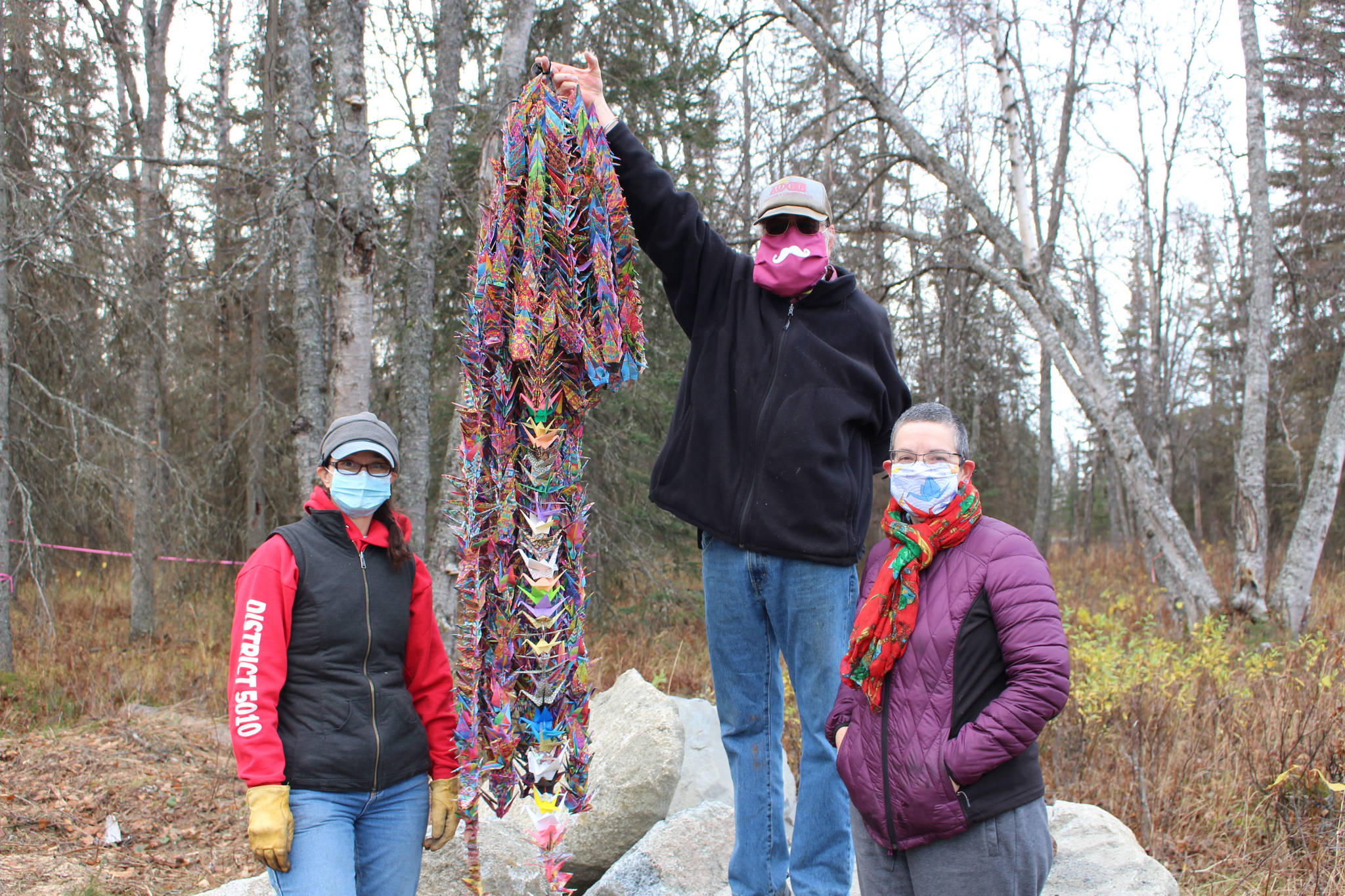Just a short walk down the road from Soldotna High School, a group of about a dozen volunteers spent their Saturday clearing brush and dead trees from a plot of land that will eventually be the site of the Kenai Peninsula Peace Crane Garden Trails.
The trails running through the 7-acre lot on Marydale Avenue have been mostly cleared and marked off with flags already, and volunteers have been working on the area since June, when the Kenai Peninsula Borough agreed to enter a 20-year lease with Shimai Toshi Garden Trails, Inc. — the nonprofit organization behind the project — and authorized the group to turn the plot into a community garden.
Sarah Pyhala, who is president of the Shimai Toshi Garden Trails board of directors and has spearheaded the project for the last three years, said the idea for the garden first took root when Pyhala and her husband, Matthew, were gifted some seeds in February of 2018.
Those uncontaminated seeds were harvested from trees that had survived the atomic bombing of Hiroshima, Japan, at the end of World War II. While trying to get the seeds to grow, Pyhala decided she wanted to be able to plant the trees in a Japanese-style garden and trail that could provide “restorative effects for visitors’ physical and psychological being,” according to the garden’s website.
Pyhala and her group struggled for about two years to find a suitable location for the garden, but in the meantime, three of the Japanese hackberry seeds and one of the gingko seeds successfully sprouted and have since grown into healthy saplings.
Then in March of this year, the Kenai Peninsula Borough Assembly agreed to lease a plot of land next to Soldotna High School for the garden. When Borough Mayor Charlie Pierce signed the lease agreement at the end of June, Phase 1 of the project was officially underway.
Despite the roughness of the current trail and the amount of dead wood still left to remove, Pyhala said she can picture the finished product as clearly as if it were already there.
“I’ve been working with our board and also a task force before that for almost three years,” Pyhala said. “And it’s all finally coming into place.”
The trail winds through the property and branches off to several different distinct spots, including a central space that will feature the garden’s namesake — a 6-foot tall Peace Crane sculpture made by local artist Christina Demetro. The sculpture is made of clay and cast in bronze. In the early stages of the project, Demetro visited 40 classrooms around the peninsula and engaged local students by teaching them how to make clay feathers, write poems and play the xylophones that will be enveloped by the wings of the finished crane statue.
Pyhala said that the statue is close to done, with the last update the installation of a donation box.
Demetro’s bronze statue will likely be the largest crane featured at the trail, but it will not be the only one.
While working on the trail Saturday, Pyhala was visited by Reverend Diane Dunn of Deer Island, Oregon, who gifted Pyhala a string of 1,000 folded paper cranes of various colors and patterns to display in the garden.
Dunn is the reverend of the Myokoin Buddhist Temple in Deer Island and came to Alaska this summer to visit her parents. She told the Clarion that she learned about the garden while doing some research on the local area, and she got the idea to put her origami skills to use.
“I was going through some very stressful times myself, and I found it very meditative to fold cranes,” Dunn said. “Before I knew it I had folded 1,500. I left those in Oregon with friends, and then when I came up here I started folding again, and when I saw the Peace Crane project I thought it would be perfect.”
Dunn, who was sporting a face mask with origami cranes on it, said she has strung cranes for many different charities and organizations over the years, both on her own and with the help of other master folders.
Pyhala said that, until the paper cranes could be hung in the gardens, she planned to encourage local businesses to hang them up and raise awareness about the garden.
The progress on the trails will continue through the winter, with Pyhala as well as members of the Soldotna Rotary Club and other volunteers coming out once a month to work.
The next major step in the project’s development will come if Pyhala receives a grant from the state’s Division of Parks and Outdoor Recreation to cover the cost of leveling out the trails and installing gravel for the paths. If all goes according to plan, Pyhala hopes to have the first iteration of the garden and trails complete by this time next year, crane statue and all.
To learn more about the Kenai Peninsula Peace Crane Garden Trails, visit akjapanesegarden.org.
Reach reporter Brian Mazurek at bmazurek@peninsulaclarion.com.

